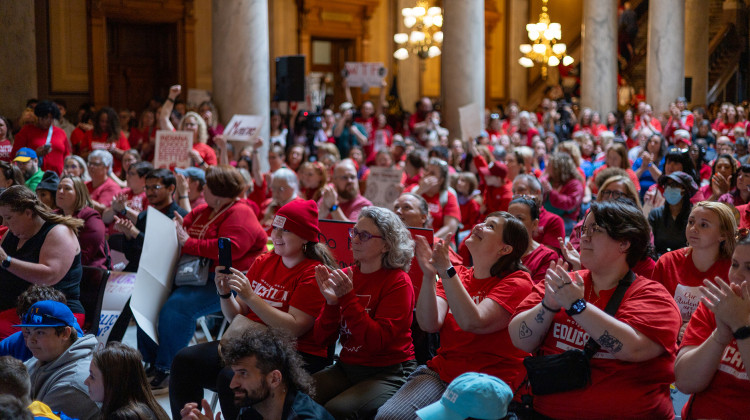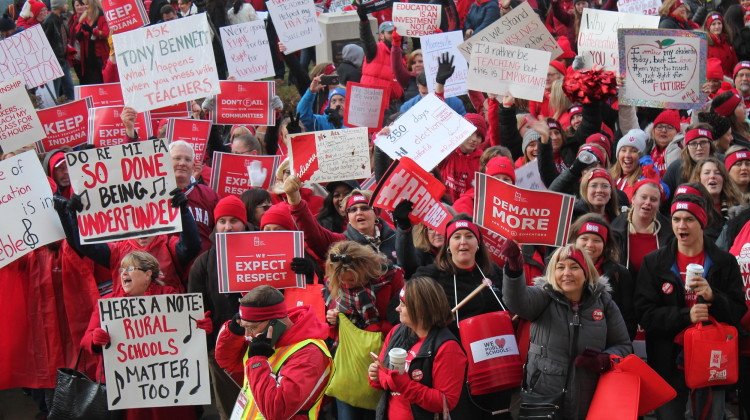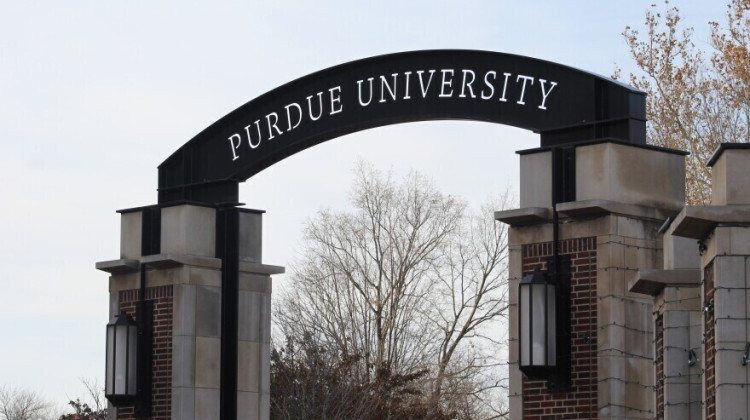
Indiana Gov. Mike Braun’s original proposal—now largely unrecognizable—sought to reduce property taxes by capping tax increases at 3% and increasing the state’s homestead exemption.
Lauren Chapman / IPB NewsHave a news tip for WFYI's education team? Share it here.
Indiana school districts remain affected by state lawmakers’ drive to cut property taxes for Hoosier homeowners, though the impact is significantly smaller than Gov. Mike Braun’s plan that would have stripped about $1.9 billion from districts.
Senate Republicans opted instead to offer relief by introducing a first-time homebuyer tax credit, a cap on levy growth, and specific deductions for veterans and seniors.
“We have worked extensively with the governor’s office to get this to a good spot,” said Travis Holdman, author of the state’s tax plan in Senate Bill 1. “We just think there’s a fine line that we have to walk to make sure that we are careful to be responsible to the local units of government.”
The latest tax plan will have the greatest impact on school districts in 2028, with an estimated reduction of more than $183 million in property tax revenue, according to the nonpartisan Legislative Services Agency.
Overall, that revenue loss amounts to about $371 million from 2026 to 2028. And around 20 schools are estimated to see a revenue increase in each of the three years.
Property tax levy caps ultimately affect school district budgets because they rely on that money to fund transportation, debt service and capital projects.
Braun has frequently expressed his desire for governments to do “more with less” to provide relief to taxpayers. In a statement after the changes to his tax plan, Braun said the legislature “has taken steps in the right direction” but more needs to be done.
“Hoosier homeowners need a solution that includes broad and immediate reductions in their tax bills,” Braun said.
Braun said he hopes to strengthen the now amended bill to include “broad-based and immediate property tax cuts for Hoosier homeowners who have been hit the hardest by skyrocketing home value inflation.”
Braun’s original proposal—now largely unrecognizable—sought to reduce property taxes by capping tax increases at 3% and increasing the state’s homestead exemption. It would have cost Indiana school districts about $1.9 billion across three years, according to LSA.
Large districts face smaller cuts
Three Central Indiana school districts would deal with millions of dollars in losses under the Republican tax plan. But Fort Wayne Community Schools stands to lose the most—about $12.6 million across three years and nearly $7 million in 2028 alone.
Indianapolis Public Schools – the state’s largest school district – would lose about $1.3 million in 2026 under the current tax plan, according to LSA.
Hamilton County is among the hardest hit by revenue drops, even after changes from Republican Senate leadership.
Hamilton Southeastern Schools would lose nearly $11 million, a massive reduction from financial projections of the original tax plan. HSE could have lost $82 million across three years from that plan.
In a statement to WFYI, HSE’s district spokeswoman Emily Pace-Abbotts said the district appreciates the progress made by the Senate and they look forward to alternative solutions that “do not result in an $11 million budget cut for our schools.”
Carmel Clay Schools—which previously called Braun’s initial plan "devastating"—would have about $9.4 million to make up in its budget across three years.
“This is bad policy, especially in light of the teacher and staff shortages we continue to battle across Indiana,” said Michael Beresford, superintendent of Carmel Clay Schools.
Beresford said in a statement that he appreciated the Senate committee’s action, but the revision still has an "extremely negative impact" on the district.
Senate Bill 1 passed the Senate Committee on Tax and Fiscal Policy and now heads to the Senate floor. It’s likely to face more changes before final approval. The legislative session must conclude by the end of April.
Here’s how much money all of the state’s school districts are projected to lose under the updated tax plan:
Rachel Fradette is the WFYI Statehouse education reporter. Contact Rachel at rfradette@wfyi.org.
 DONATE
DONATE






 Support WFYI. We can't do it without you.
Support WFYI. We can't do it without you.